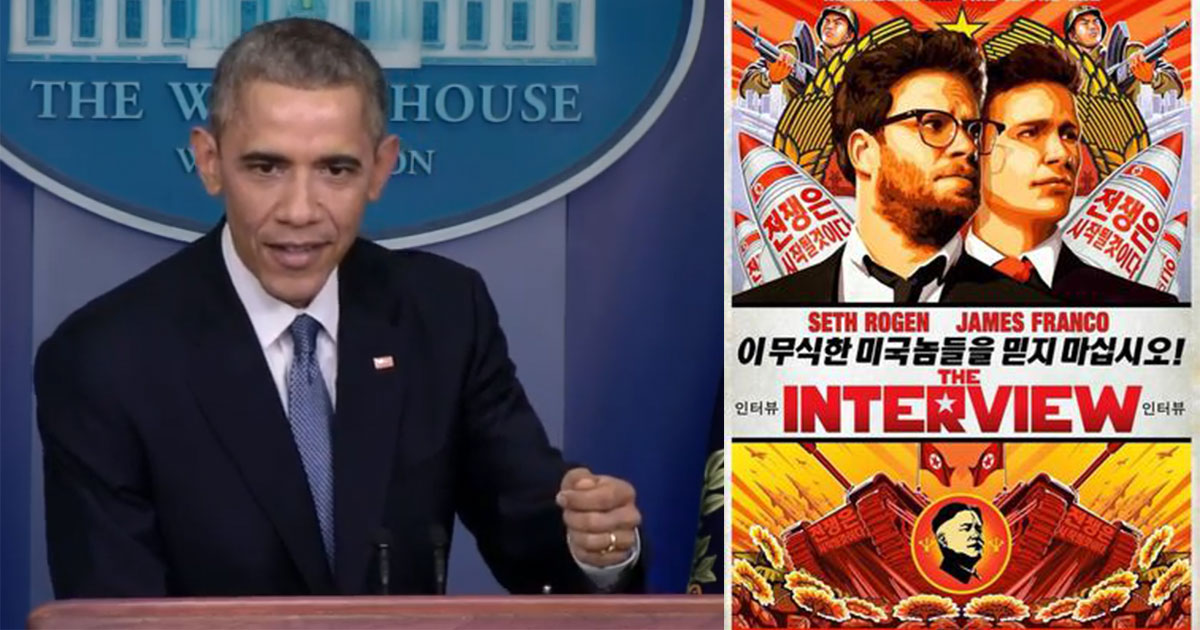President Obama Just Took A Major Stand on Whether Sony Should Release 'The Interview'

By:

President Obama thinks Sony made a mistake yesterday when it canceled the release of The Interview, a film depicting the assassination of North Korean dictator Kim Jong-un that was previously scheduled for a December 25th release. Sony made the move after hackers devastated the company with leaked private emails and personal information and threatened an attack against theaters that exhibited the movie. The FBI says that the North Korean government was involved the attack. The thorny ethical issues of the cancelation of the movie’s release pit conflicting values against one another: privacy versus freedom of information and safety versus freedom of choice and expression.
President Obama weighed into that debate today.
"I think they made a mistake," President Obama said of Sony's decision to cancel the film's release. "I wish they would have spoken to me first. I would have told them: Do not get into the pattern in which you are intimidated."
Obama also stressed the importance of protecting First Amendment rights.
"We cannot have a society in which some dictator someplace can impose censorship in the United States," he said.
Theaters cited safety and financial concerns as reasons for their decision, but many celebrities have also spoken out against what they see as setting a dangerous precedent of curbing freedoms and capitulating to terrorists. Rainn Wilson tweeted on Wednesday: “Kim Jong Un: 1. America: 0.”
Was it right to publish those emails?
The hacked materials contained email correspondence between Sony executives, some of it unflattering, but much of it also newsworthy.
Those who were against the publication of the hacked materials argue that reporters aided the Guardians of Peace, the hackers who are somehow associated with North Korea.
"[L]et’s just say that every news outlet that did the bidding of the Guardians of Peace is morally treasonous and spectacularly dishonorable," screenwriter Aaron Sorkin wrote in the New York Times. Sorkin also said that, unlike like the Pentagon Papers, which were stolen and released in the 1970s and contained damaging information about the US government's handling of the Vietnam War, these emails were printed simply because they were salacious.
On the other hand, many media outlets that chose to disseminate the hacked information used the arms race argument: if we hadn’t posted it, someone else would have, and that would have been a more dangerous outcome.
“The new role of journalists, for better or for worse, isn’t as gatekeepers, but interpreters," BuzzFeed’s Anne Helen Petersen wrote. "If they don’t parse it, others without the experience, credentials, or mindfulness toward protecting personal information certainly will.”
Putting the ethics to the test
To delve into the complicated ethical issues behind the dissemination of the hacked information and the decision not to release The Interview, let’s use a framework for moral decision making provided by Santa Clara University’s Markkula Center for Applied Ethics and developed by Manuel Velasquez, Claire Andre, Thomas Shanks, S.J., and Michael J. Meyer. This framework offers five approaches to evaluating an ethical issue, based on five schools of philosophical thought:
1) Utilitarian Approach (Potential Benefits vs. Harms)
Let’s imagine that on November 24th, a representative from every news outlet sat in a room together, staring at one massive hard drive that contained all of the stolen data. There seems to be few benefits that were derived from releasing this data. One cited benefit is that the public has learned that gender pay gaps and possible racism in one of America’s major studios. While exposing such mindsets and practices has value, unless these exposures result in a change of attitude and protocol, they may not outweigh the harms, such as the medical records, Social Security numbers, and salaries that were also released and no longer private. Another potential harm of disseminating this information is that it has empowered the Guardians of Peace, whose threats escalated to promises of attacks reminiscent of 9/11. Theaters also had to weigh the safety of their patrons and their potential liability against the filmmakers’ freedom of expression and their patrons’ freedom of choice.
It’s much easier to sound off against this decision, as many celebrities have done, than to have to make it in the first place.
2) Rights Approach
When the stolen data was disseminated, whose rights were being prioritized? Does the right to pursue knowledge supersede the right to privacy? To report on the stolen information with little or no sense of discrimination seems to imply that anything goes in journalism – as long as someone else does the dirty work.
Within the justice system, the exclusionary rule protects citizens from illegal searches and seizures, and evidence collected in such a search may be inadmissible in court. The course of action that best represented the rights of the affected parties may have been for journalists to refrain from reporting the stolen information – or at least to exercise more discernment in evaluating what the public needed to know versus what would make headlines.
3) Fairness Approach
Publicizing stolen and confidential data is not an example of equal and fair treatment; the victims of the hack are treated as unimportant casualties by those who assured themselves: “Well, it’s already out there, so we might as well be reporting on it.” Once information from the hacks began appearing on the Internet, it became all too easy for journalists to justify the frenzied hunt to find a new scoop within the massive pile of stolen information.
Is it fair to Seth Rogen, James Franco and everyone involved in making The Interview for Sony to decide not to release it? Perhaps not, but their rights and the “fairness” with which they’re treated needs to be considered in the context of those at Sony making a decision that could potentially put lives at risk.
4) Common Good Approach
The Sony hack will most likely make people think twice about what they put in an email, and this could be said to advance the common good. As any victim of a hack would tell you, the Internet is not impenetrable, and it’s remarkably easy for “private” information or correspondence to become public. If this hack makes studio executives reexamine mindsets or offhand remarks that are racist or sexist, then perhaps releasing their private correspondence did advance the common good.
Would screening The Interview have advanced the common good? If the threats of the Guardians of Peace were credible, doing so could have been catastrophic. To choose not to screen the movie is to capitulate to the methods of terror this group employed, and to make this decision is to decide that safety is a more important common good than freedom of choice and of expression.
5) Virtue Approach
The decision-makers in this situation – the journalists, the theaters, and Sony – may not have ranked “virtue” as a top concern when weighing pros and cons. But they ultimately had to take sides in the conflict between information and privacy, and between safety and creative freedom. Even if practical concerns, such as keeping up with competitors and safeguarding against financial loss, were prioritized in the decision-making process, these decisions set a precedent that will surely be judged on the basis of its ethical implications.
The true lesson of the Sony hack is that the Internet is not an impenetrable vault. There are no easy answers, but it’s important for journalists and the public at large to be having conversations about this hack and about future hacks: what’s fair game to report on, and what’s the cost to those whose lives are now under public scrutiny? When terrorist groups threaten American lives and citizens, how do we best respond in a way that protects our lives and our freedoms?
